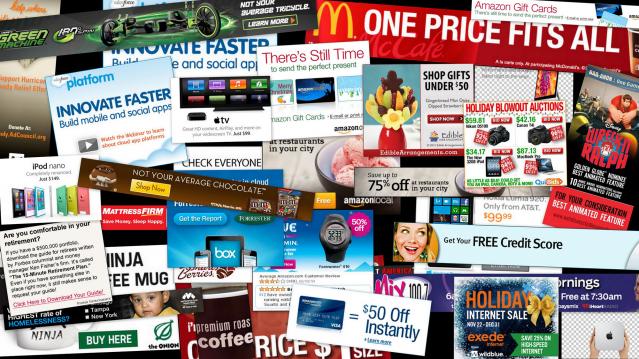The Amount of Money Lost to Ad-Blocking Is Skyrocketing

Are you annoyed by online pop-up ads or those video commercials that automatically start playing when you visit a new Web page? Worried about advertisers collecting your personal information online? You’re not alone. In the perpetual cat and mouse game between marketers and Internet users, the utilization of ad-blocking software by Web surfers is growing rapidly — and it’s costing advertisers billions.
Ad-blocking technology was employed by 45 million active users during the second quarter of 2015, a new report by PageFair and Adobe found. This represents 16 percent of the U.S. online population. In the past year, the number of users blocking ads grew by 48 percent.
In 2014, ad-blocking in the U.S. cost an estimated $5.8 billion in lost advertising revenue. That figure is expected to jump to $10.7 billion in 2015 and $20.3 billion in 2016 as more users adopt the practice. The new version of Apple’s mobile operating system coming this fall is expected to make the problem worse, since it will allow iPhone users to block ads in Safari with a simple app.
In addition to lost revenue, ad-blocking skews the demographics of the online audience. Websites that cater to younger users — a demographic advertisers are eager to target — are the ones most significantly affected by ad-blocking.
Related: The Future of Advertising: Everything, Everywhere, All the Time
A survey in the PageFair/Adobe report found that the main reason individuals block ads is a concern about advertisers mishandling personal data.
Advertisers have a long way to go when it comes to trust. An article in AdAge argues that marketers should be more transparent about the ways they use the information they collect. It recommends giving users more control of their personal data, the ability to decide how much information to share and the choice to opt-out at any time.
Trust isn’t the only issue, though. The appeal of ad-blocking is growing as “malvertising” attacks become more common. Last month, Yahoo’s ad network was targeted for seven days by hackers who sent out corrupt bits of code through Flash-based ads to visitors on Yahoo’s popular sites. Some users were redirected to sites that paid the hackers for traffic, while others had their computers locked for ransom.
Top Reads from The Fiscal Times:
- Bush Looks to Make Up for Past Blunders on Iraq Policy
- Oil Sector Insiders Signal It’s Time to Buy
- How a Soaring Dollar Forced China to Devalue Its Currency
It’s Official: No Government Shutdown – for Now

President Trump signed a short-term continuing resolution today to fund the federal government through Friday, December 22.
Bloomberg called the maneuver “a monumental piece of can kicking,” which is no doubt the case, but at least you’ll be able to visit your favorite national park over the weekend.
Here's to small victories!
Greenspan Has a Warning About the GOP Tax Plan

The Republican tax cuts won’t do much for economic growth, former Federal Reserve Chair Alan Greenspan told CNBC Wednesday, but they will damage the country’s fiscal situation while creating the threat of stagflation. "This is a terrible fiscal situation we've got ourselves into," Greenspan said. "The administration is doing tax cuts and a spending decrease, but he's doing them in the wrong order. What we need right now is to focus totally on reducing the debt."
The US Economy Hits a Sweet Spot

“The U.S. economy is running at its full potential for the first time in a decade, a new milestone for an expansion now in its ninth year,” The Wall Street Journal reports. But the milestone was reached, in part, because the Congressional Budget Office has, over the last 10 years, downgraded its estimate of the economy’s potential output. “Some economists think more slack remains in the job market than October’s 4.1% unemployment rate would suggest. Also, economic output is still well below its potential level based on estimates produced a decade ago by the CBO.”
The New York Times Drums Up Opposition to the Tax Bill

The New York Times editorial board took to Twitter Wednesday “to urge the Senate to reject a tax bill that hurts the middle class & the nation's fiscal health.”
Using the hashtag #thetaxbillshurts, the NYT Opinion account posted phone numbers for Sens. Susan Collins, Bob Corker, Jeff Flake, James Lankford, John McCain, Lisa Murkowski and Jerry Moran. It urged readers to call the senators and encourage them to oppose the bill.
In an editorial published Tuesday night, the Times wrote that “Republican senators have a choice. They can follow the will of their donors and vote to take money from the middle class and give it to the wealthiest people in the world. Or they can vote no, to protect the public and the financial health of the government.”
Like what you're reading? Sign up for our free newsletter.
Can Trump Succeed Where Mnuchin and Cohn Have Flopped?

President Trump met with members of the Senate Finance Committee Monday and is scheduled to attend Senate Republicans’ weekly policy lunch and make a personal push for the tax plan on Tuesday. Will he be a more effective salesman than surrogates in his administration?
Politico’s Annie Karni and Eliana Johnson report that both Democrats and Republicans say Mnuchin and chief economic adviser Gary Cohn have repeatedly botched their tax pitches, “in part due to their own backgrounds” as wealthy Goldman Sachs alums. “House Speaker Paul Ryan earlier this month asked the White House not to send Mnuchin to the Hill to talk with Republican lawmakers about the bill, according to two people familiar with the discussions — though Ryan has praised the Treasury secretary’s ability to improve the legislation itself,” Karni and Johnson write.
